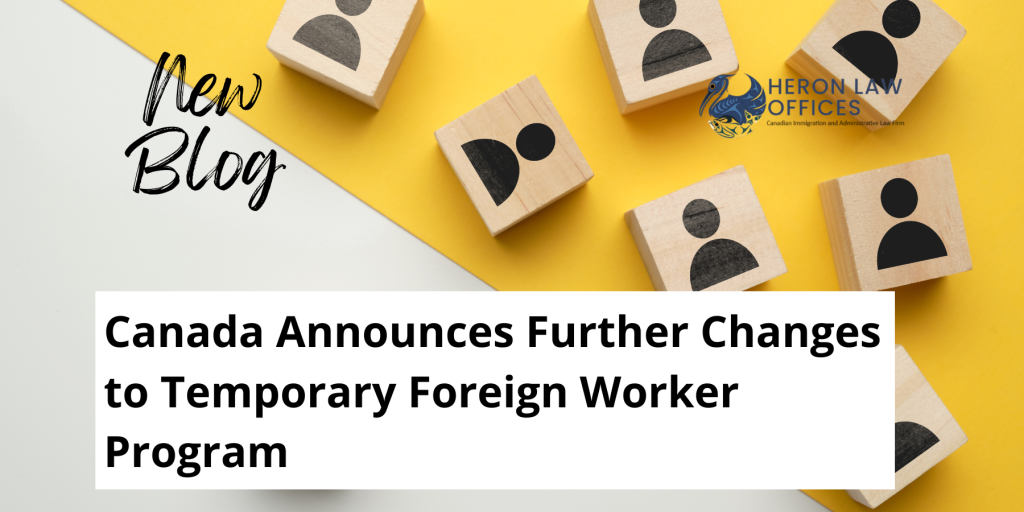
By Laura Schemitsch, Canadian Immigration and Refugee Lawyer, Heron Law Offices
Major Changes to the Temporary Foreign Worker Program in 2024: Essential LMIA Updates for Employers!
This blog post is a follow-up to a previous post regarding recent changes to the Low Wage Labour Market Impact Assessment (“LMIA”) stream: Foreign Workers in Canada: Recent Announcements Spell Out Significant Changes
As anticipated, further changes to the Temporary Foreign Worker Program (“TFWP”) have been announced. On October 21, 2024, Minister Randy Boissonnault, announced further targeted reforms to the TFWP, in this case, to the high-wage LMIA stream.
What is the TFWP? Why does an employer need an LMIA?
In order for a foreign worker to obtain a work permit under the TFWP, an employer first needs a positive LMIA from Employment and Social Development Canada (“ESDC”). According to ESDC, the TFWP allows Canadian employers to hire foreign workers to fill temporary jobs when qualified Canadians and permanent residents are not available. LMIAs are regulated in accordance with the Immigration and Refugee Protection Act (‘Act’) and the Immigration and Refugee Protection Regulations (‘Regulations’).
The LMIA process can be complex, costly to the employer, and lengthy, and there is no guarantee of success.
What is a High Wage LMIA and What Has Changed?
Whether an employer needs a high or low wage LMIA is determined by the province where the employer is operating and the hourly wage of the position. If the hourly wage being offered to the foreign worker is at or above the median hourly wage, you must apply under the high wage stream.
As part of Minister Boissonnault’s announcement, effective November 8, 2024, the starting hourly wage for workers coming into Canada through the high-wage stream will be increased to 20% higher than its current level, the median wage. This represents an increase “to the existing threshold of between $5 and $8 per hour, depending on the province or territory of work.” The government’s announcement indicates the reform is “designed to prioritize the hiring of domestic workers.” The announcement is in keeping with the government’s recent efforts to bow to public pressure to tighten border restrictions, initially targeting students and now workers. However, an unintended effect will likely be increased financial pressure on small to medium size businesses who still struggle to recruit domestic employees, particularly in more niche positions across the country.
Additional Changes to TFWP
In addition, the government announced that as of October 28, 2024, employers will no longer be able to use attestations from professional accountants or lawyers to provide their business legitimacy.
Book an LMIA Consultation Today
If you are an employer seeking to hire foreign workers, it is a particularly important time to keep up to date with significant changes to the program which may impact your ability to apply for an LMIA.

Laura has successfully represented clients before the Immigration and Refugee Board of Canada and has assisted clients overcome complex immigration issues including application refusals, humanitarian and compassionate requests, inadmissibility issues, procedural fairness letter responses and judicial reviews. Laura helps employers, entrepreneurs, permanent resident applicants, temporary foreign workers, international students, and visitors on their unique Canadian immigration journeys.
Laura Schemitsch has been practicing Canadian immigration and refugee law since 2019 with a wide scope of matters and complexity. She earned her Juris Doctor from the University of Ottawa in 2019 with specializations in Public Law and Law and Social Justice. Prior to studying law, she earned her Bachelor of Arts with Honours from McMaster University majoring in History, and a Master of Arts from Queen’s University in Art History.
Laura’s academic work has been published in peer reviewed journals and prominent media outlets. In November 2022, Laura was invited to speak before the Standing Committee on Citizenship and Immigration in Canada’s House of Commons.
Laura found her passion for immigration and refugee law in 2017 when she joined Capital Rainbow Refuge, a private sponsorship group that brings LGBTQIA2S+ asylum seekers to Ottawa. Laura completed her articling placement at Gerami Law PC, a boutique immigration and refugee law firm in Ottawa between August 2019 and June 2020 and was hired back as an immigration and refugee lawyer. Laura moved to British Columbia in June 2020 with her family and transferred her law licence to B.C.. She worked in the Sea to Sky region until starting at Heron Law Offices in June 2023.



